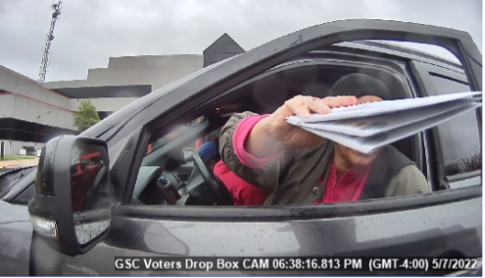Some of us are old enough to remember that virtually every election in US history has been decided the same night - sometimes stretching into the wee hours, but we always woke up to the winner. That all changed in the 2020 'mail-in ballot' election, when several major Democrat cities stopped counting ballots at 9PM - in one instance because an alleged 'burst pipe' forced an evacuation in Fulton County, Georgia. Then there were ballot-counters in Detroit who covered windows with cardboard so that observers couldn't watch the count.
A brief review of election night malarkey from 2020:
Fulton County, Georgia (Atlanta):
- Fulton County, where Atlanta is located, temporarily paused counting ballots around 10:30 p.m. on Election Night due to a burst water pipe earlier in the day that delayed the processing of absentee ballots at the State Farm Arena. While there were initial reports that the counting had stopped, election officials clarified that counting continued but at a slower pace with some workers leaving for the night.
Philadelphia, Pennsylvania:
- Philadelphia, a critical city in Pennsylvania, saw intermittent pauses in the ballot-counting process. Officials announced they would stop counting for the night around 9 p.m. and resume the next morning. However, counting continued throughout the night at a reduced pace to process the large volume of mail-in and absentee ballots.
Allegheny County, Pennsylvania (Pittsburgh):
- Allegheny County also paused counting around midnight on Election Night due to a court order involving around 29,000 ballots that required special handling. Counting resumed the following day after the specific issue was resolved.
Milwaukee County, Wisconsin:
- Milwaukee, another key city, saw Donald Trump leading Joe Biden by 109,000 votes - until an overnight count of roughly 170,000 mail-in votes gave Biden a lead of 11,000 votes.
Maricopa County, Arizona (Phoenix):
- In Maricopa County, GOP chairwoman Linda Brickman on Nov. 30 testified before members of the Arizona State Legislature that she personally observed votes for President Donald Trump being tallied as votes for Democratic presidential nominee Joe Biden when input into Dominion machines.
For the second straight presidential election, it is becoming increasingly likely that there will be no clear and immediate winner on election night and that early returns could give a false impression of who will ultimately prevail.
Large swaths of Americans have changed their voting habits in recent years, relying increasingly on mail-in ballots, which take more time to count than those cast in person on Election Day. States with prolonged vote-counting processes, such as Arizona, have become suddenly competitive. And the race between Vice President Kamala Harris and former President Donald J. Trump appears extremely close.
According to the Election Project, Democrats turned in 18 million mail-in ballots in the 2020 election vs. 10 million from Republicans in the 20 states that reported party registration by ballot. By the 2022 midterms, Democrats turned in 7.6 million ballots vs. 5.1 million from Republicans.
For this election, the Trump campaign and the RNC have begun a program called "Swamp the Vote" designed to encourage voters to cast early ballots - including by mail. The campaign has also released a memo warning of a "blue mirage," saying that "early Democrat leads in absentee and vote by mail are not at all predictive of victory on November 5th."
That said, last month at a Montana rally, Trump said "We want to go back to one-day voting and paper ballots."
According to pollster Nate Silver, Trump has a clear advantage over Harris. Until election night, we assume.
Battleground States
With the election just over 6 weeks away, two critical battleground states - Pennsylvania and Wisconsin - are facing potential delays in reporting full results.
Democrats have called for reforms to allow election officials to open and flatten ballots, known as "preprocessing," before the polls open on Election Day. State lawmakers have refused to budge.
According to the Times, the delays are likely to be most pronounced in the aforementioned cities of Philadelphia and Milwaukee, which are home to large numbers of Democratic voters. These cities could take longer to count their ballots than less populous counties simply due to the sheer volume of votes. Paulina Gutierrez, executive director of the Milwaukee Election Commission, estimates around 80,000 mail ballots in Milwaukee alone—up significantly from the 30,000 received during the midterms. "I will prioritize the security and the integrity of the election over speed any day," she said.
The slow vote-counting process means Wisconsin will not have full results on Election Night. Ann Jacobs, the Democratic chair of the Wisconsin Election Board, anticipates Milwaukee to finish counting at 3 a.m. or later. The potential delay in Pennsylvania is also raising concerns about premature assumptions of victory. As Michael McDonald, a political science professor at the University of Florida, explained, "In Wisconsin and Pennsylvania, that’s where we’re going to see the potential for this red mirage and the ballot dumps and all of those conspiracy theories that will arise from it."
Arizona and Nevada, two other battleground states, are also likely to face delays, although for different reasons. Both states rely heavily on mail-in voting. In the 2020 presidential race, Nevada wasn't called for Joe Biden until four days after the election, while Arizona took nine days. While both states allow local officials time to preprocess ballots, high voter turnout and the logistics of counting large numbers of mail-in ballots mean that a final call in either state could still take time.
Of course, it seems nothing can be done when Democrats engage in 'legal' election manipulation...

No comments:
Post a Comment
Note: Only a member of this blog may post a comment.